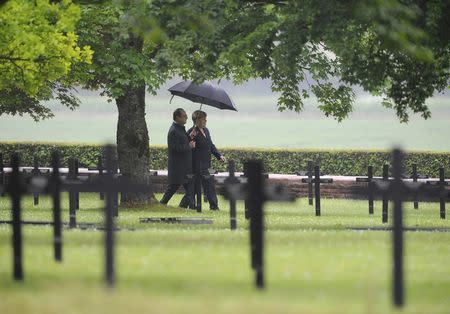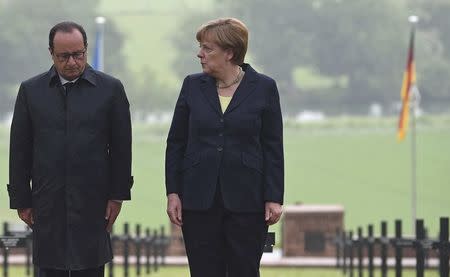Merkel, Hollande together mark 100 years since Verdun battle
VERDUN, France (Reuters) - German Chancellor Angela Merkel and French President Francois Hollande marked the 100-year anniversary of the Battle of Verdun side-by-side on Sunday, laying a wreath at a cemetery in northeastern France for the 300,000 soldiers killed. The Verdun battle was one of the longest in World War I, lasting more than 300 days from February to December 1916, and its commemoration has come to signify the reconciliation between Germany and France after decades of hostility and distrust following two world wars. "We are side by side to tackle the challenges of today and first of all the future of Europe, because, as we know disappointment was followed by disenchantment, and after doubts came suspicion, and for some even rejection or break-up," Hollande said in a closing speech at the ceremony. It was not until 1984 that the neighbours carried out a joint ceremony to mark the Verdun battle, another step towards ending decades of residual hostility. A photo of then French President Francois Mitterrand and then German Chancellor Helmut Kohl holding hands in the Douaumont cemetery at Verdun became a symbol of a new era of reconciliation. That year also saw France and Germany agreeing on the gradual abolition of border checks, a precursor to the Schengen zone of passport-free travel, launched by five European countries the following year. Rain fell for part of the ceremony on Sunday and Hollande held an umbrella for Merkel and himself as they made their way to the German cemetery Consenvoy to lay a wreath. In 2016, some of the foundations of the European Union appear under stress. Britain's referendum next month on EU membership, Islamist militant attacks in EU capitals, the biggest migrant crisis since World War II and a slow economic recovery have strained relations in the bloc. Hollande said earlier this week that his discussions with Merkel would focus on Europe's future, including the migrant crisis, security and the rise of populist movements. "In the European Union we will continue to have different views on certain issues," Merkel said. "That is in the nature of things but it will prove beneficial if we demonstrate our ability to compromise to reach an agreement". In her weekly podcast, the Chancellor said Germany's relations with France had stood fast even when the countries had diverging opinions, and that Europe would have to adapt. "Europe has problems but Europe has also managed to do a lot and it has come a long way. In a world of global challenges it is important to develop Europe further and to push through the changes that are necessary," she said. (Reporting by Gilbert Reilhac in Verdun, Maya Nikolaeva in Paris; and Francesco Canepa in Frankfurt; Editing by Richard Balmforth)


